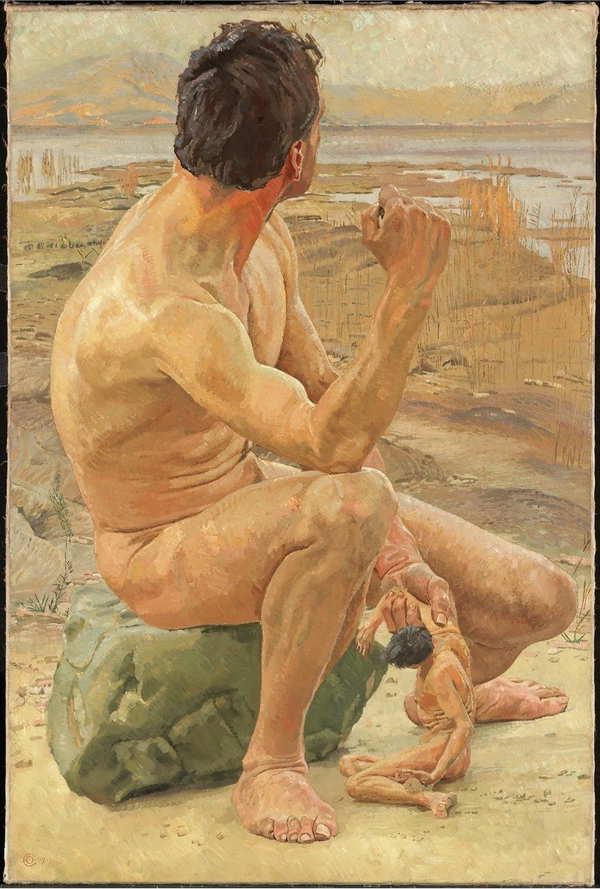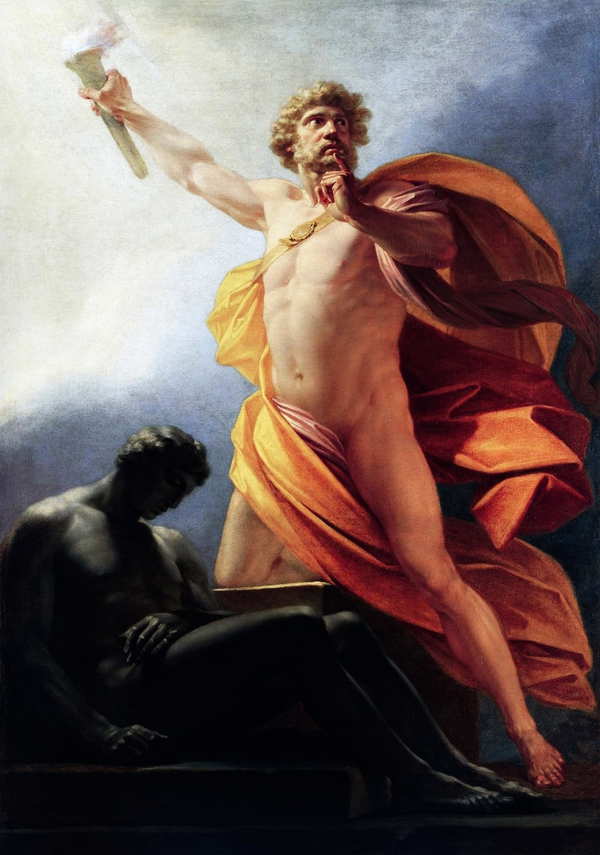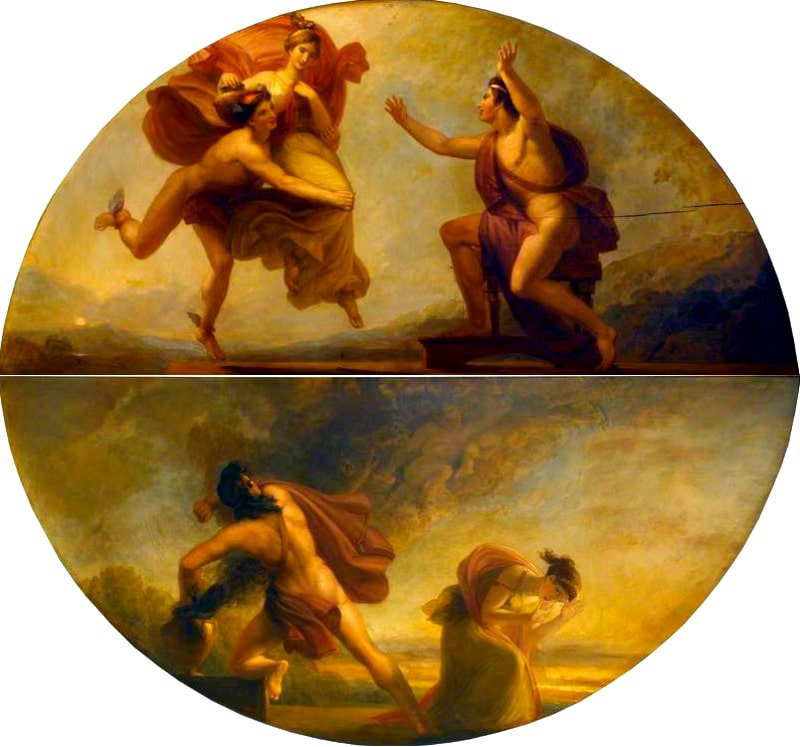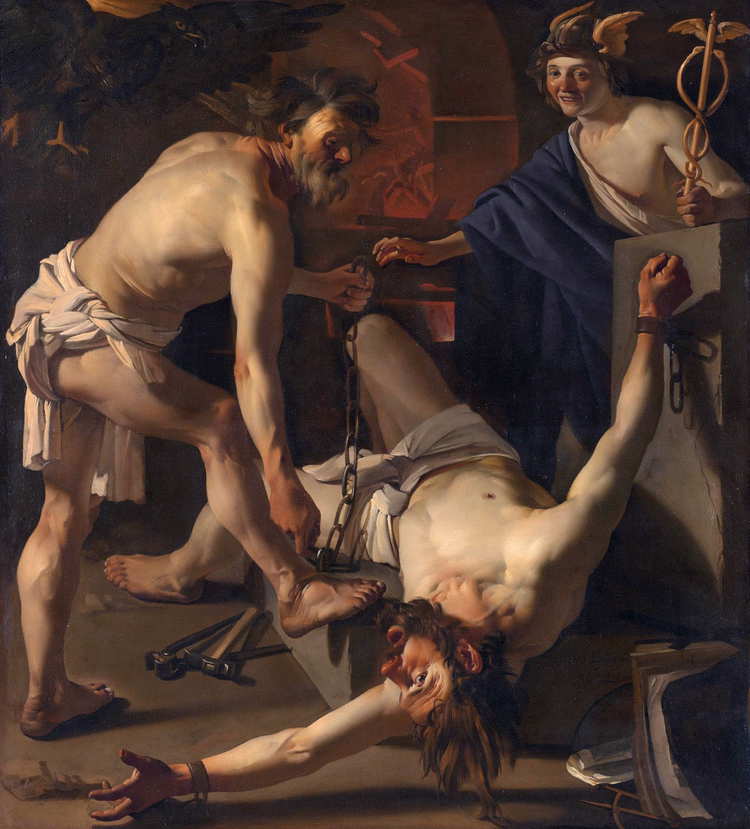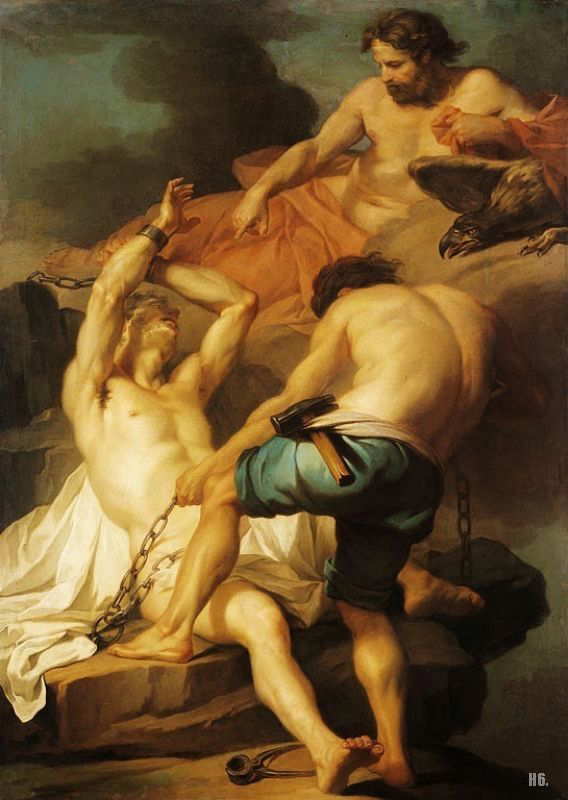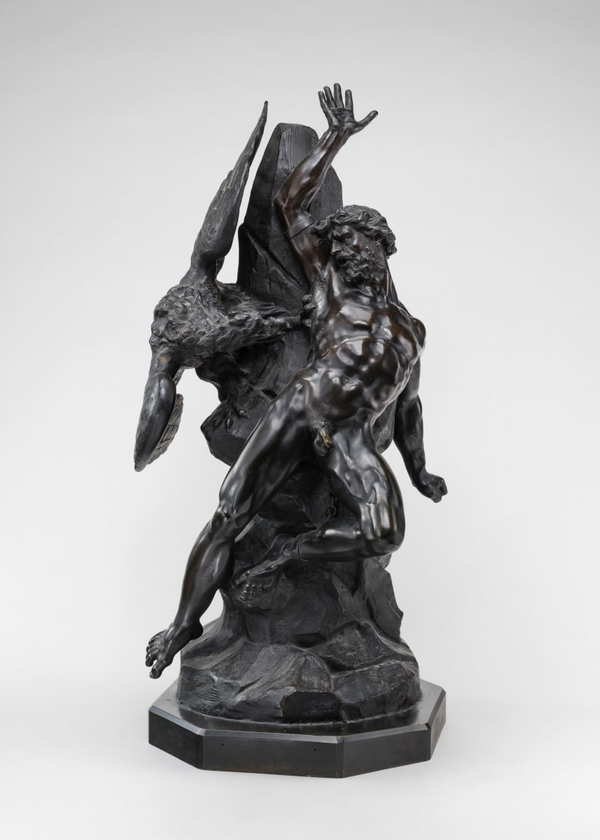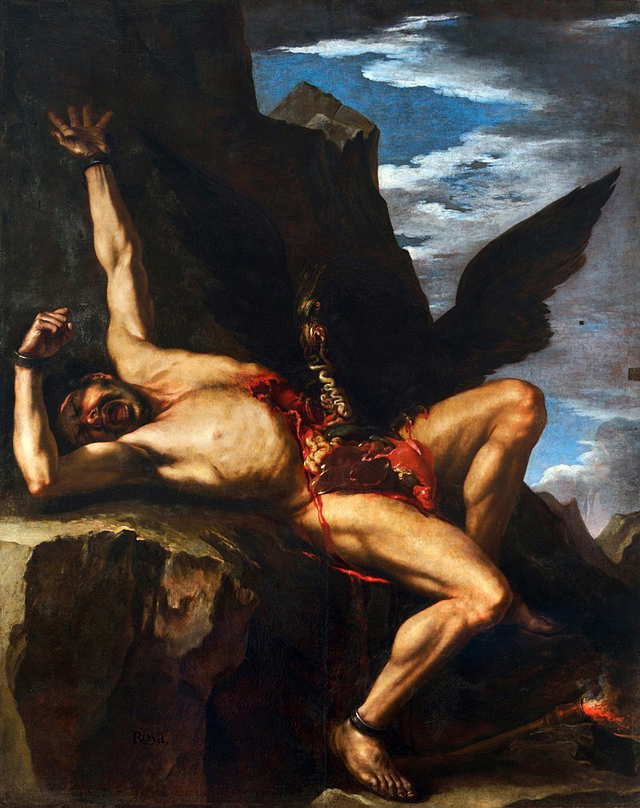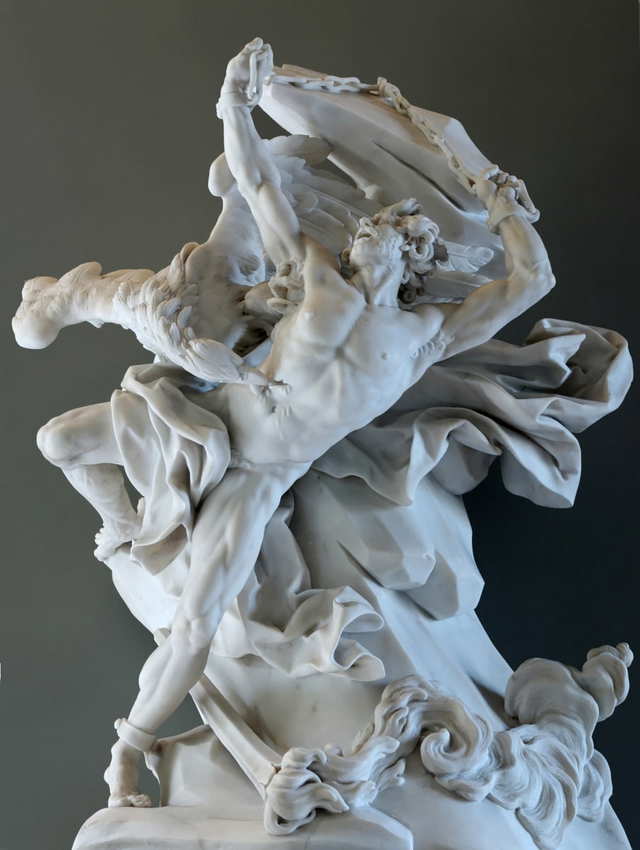15 vivid works of art bring the horrifying story of the Titan Prometheus to life through Aeschylus’s tragedy, Prometheus Bound.
Mar 16, 2023 • By Marian Vermeulen, BA History and Philosophy
Prometheus’s Story has been told and retold over millennia, with interpretations of its meaning changing depending on the author. The core mythology can first be seen in Hesiod’s Theogony. Later authors would build upon these myths, turning them into compelling philosophical musings. Greek playwright Aeschylus chose Prometheus as the central character of a multi-part series. The only play that has survived to this day is the first in the series, the tragedy of Prometheus Bound. Scholars agree that Aeschyus did not intend this work to be self-standing. Prometheus Bound would be followed by the now-lost tragedy Prometheus Unbound. There is also speculation about a third play titled Prometheus Fire-Bearer.
1. The Mythology Behind Aeschylus’ Prometheus Bound

Prometheus was a Titan, the son of Iapetus. His father was a member of the first generation of gods, ruled by Cronus and overthrown by Zeus and his siblings in the great Titanomachy. Prometheus’s role in that war is one aspect of the story that is changeable. He clearly did not take any part in actively opposing Zeus’s coup, and in Aeschylus’s Prometheus Bound, Prometheus actually had a critical role in securing Zeus’s victory. Hesiod names Prometheus merely as a trickster, but later interpretations of Prometheus’s story provided him with a far more sympathetic cause.
2. Prometheus Creates Mankind
Prometheus, by Otto Greiner, 1909, via the National Gallery of Canada, Ottawa
In the aftermath of the great war, all the creatures of the earth had been destroyed. Zeus directed Prometheus and his brother Epimetheus to make new creatures to walk the planet, and he gave them various gifts to be bestowed upon their creations. Prometheus carefully fashioned men out of clay in the image of the gods, but his brother quickly created as many different animals as he could, giving each of them the gifts that Zeus had allowed them. When Prometheus had finished, the animals were stronger and faster, and sat warm at night in their thick coats while the humans froze.
3. Stealing the Sacred Flame
The Creation of Man by Prometheus, by Heinrich von Füger, 1790, via the Princely Collection of Liechtenstein, Vienna
Sign up to our Free Weekly Newsletter
Feeling sorry for his creations, Prometheus asked Zeus if he could teach them how to make fire. Zeus refused as fire was sacred to the gods, so Prometheus stole it and brought it to mankind. Initially angered, Zeus was appeased when men began burning the best meat on altars to the gods, being pleased with the sacrifice. Yet once again in his story, Prometheus defied the gods in favor of his humans. He had them butcher an ox and split the meat into two piles. In one were all the best cuts of meat, but the meat lay hidden beneath sinews and bones. In the other, Prometheus told them to cover the remaining bones and entrails with marbled fat. He invited Zeus to come down to earth and to choose the pile that he desired as an offering.
4. Pandora
Epimetheus Receiving Pandora and The Opening of Pandora’s Vase ceiling painting by Henry Howard, 1834, via ArtUK
Zeus chose, as expected, the pile that looked the best but contained all the scraps beneath, and at that, Zeus became enraged. Prometheus had stolen sacred fire for mankind, and now taught them how to trick and cheat, even cheating the gods. To punish humanity, Zeus asked Hephaestus, Athena, and Aphrodite to craft for him a beautiful woman, modeled after Aphrodite. They named her Pandora. Zeus bestowed upon her a deep curiosity, gave her a box that he told her never to open, and offered her in marriage to Epimetheus. Though suspicious, Epimetheus was entranced by Pandora’s beauty and could not resist the offer. Of course, Pandora’s curiosity became too much for her, and she peeked inside, accidentally releasing from the box all the evils of the world, and only just managed to preserve hope.
5. Prometheus Bound to the Rocks of the Caucasus
Prometheus Being Chained by Vulcan, by Dirck van Baburen, 1623, via Rijks Museum, Amsterdam
Zeus’s punishment for Prometheus was equally horrible. Under his father’s orders, Hephaestus, reluctantly for he had a kind heart, chained Prometheus to the top of the Caucasus Mountains. Every day an eagle, the symbol of Zeus, would swoop down and peck out Prometheus’s liver to eat. However, as he was an immortal Titan, each night the liver would grow back again, and the eagle would return the following day to eat it once again, on and on, for eternity. This is Prometheus’ story up until Aeschylus’ Prometheus Bound.
6. Prometheus Bound by Aeschylus
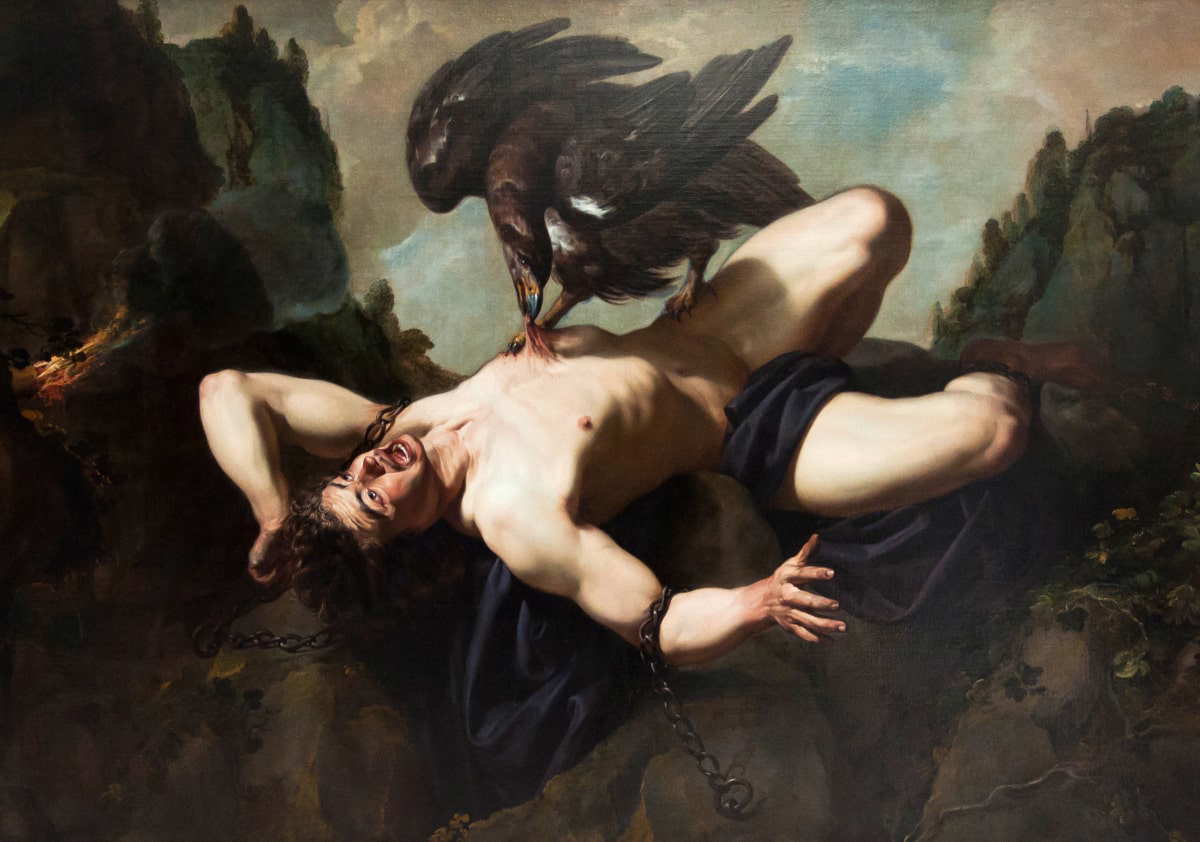
The basic mythology makes little, if any, comment on the actions of Zeus and Prometheus and does not speculate upon the justice of the punishment. However, Aeschylus, the Greek playwright of the 5th and 6th centuries BCE, chose to examine Prometheus’s story as a philosophical dive into morality and oppression. In his version, called Prometheus Bound, Prometheus is a hero of mankind and a victim of Zeus’s cruel and unjust tyranny.
7. Kratos and Bia
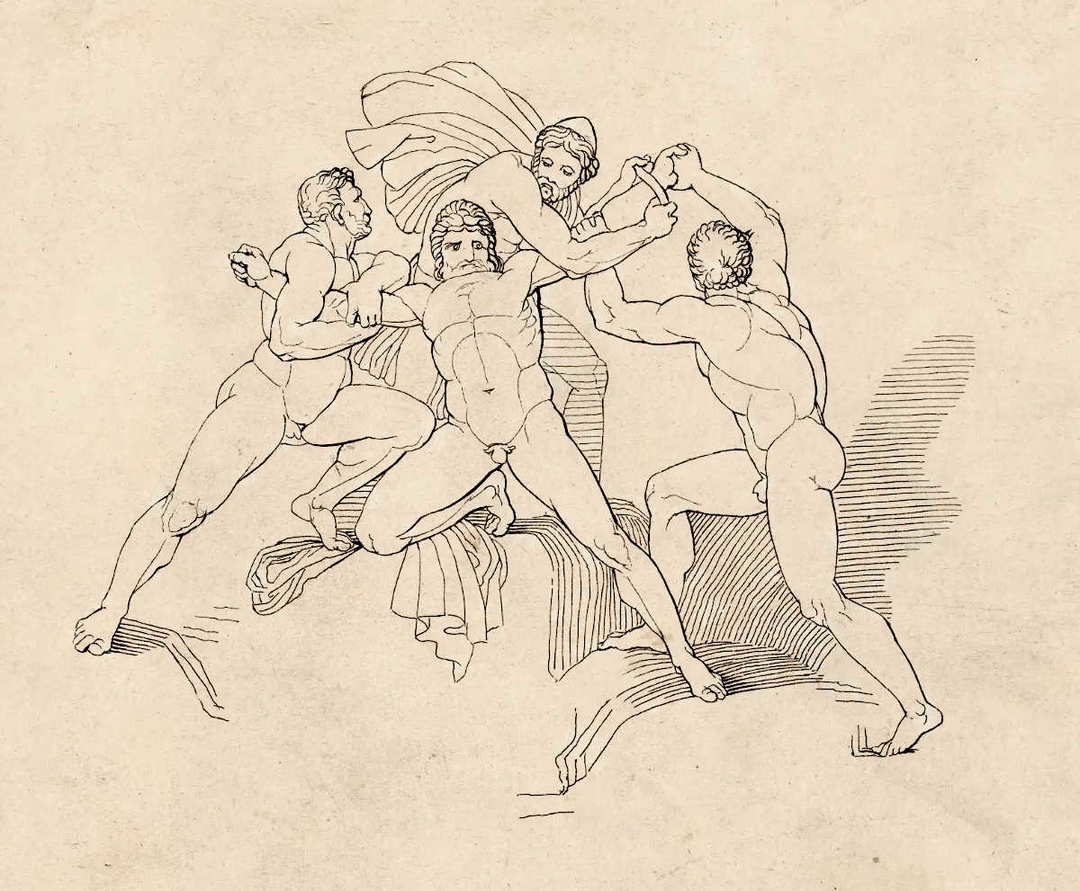
The play begins with Kratos and Bia, siblings and personifications of strength and force/violence, executing Zeus’ orders and taking Prometheus to the Caucasus where he is set to endure his torturous sentence. Kratos says that Prometheus is guilty of stealing fire and offering it to humankind. For this, he must be punished. Only through punishment will he learn to obey the will of Zeus: “That he may learn to bear Zeus’ tyranny / And cease to play the lover of mankind.”
8. Hephaestus Condemns Zeus’ Decision and Chains Prometheus
Vulcan Chaining Prometheus, by Jean Charles Frontier, 1744, via the National School of Fine Arts, Paris
Hephaestus folows Bia and Kratos to the Caucasus as he is tasked with chaining Prometheus. However, even he condemns his father’s actions. However, Kratos warns him that he must obey Zeus’ orders and that Prometheus deserves the punishment. Hephaestus proceeds to chain Prometheus on the rock and warns him:
“thy long watch shall be comfortless, stretched on this rock, never to close an eye or bend a knee; and vainly shalt thou lift, with groanings deep and lamentable cries, thy voice; for Zeus is hard to be entreated, as new-born power is ever pitiless.”
After everyone leaves, Prometheus is left alone. He invites nature to witness the unjust torture that he has to go through and reveals that he can see into the future, possessing the knowledge of all that is going to happen.
9. The Oceanids Offer Sympathy

Newly chained to the mountain, Prometheus Bound begins with the unfortunate Titan lamenting his fate. He is soon joined by the daughters of the Titan Oceanus, who have come to commiserate with Prometheus. In his conversation with them, he explains how he aided Zeus in his triumph over the Titans and that when Zeus expressed his desire to destroy all mankind, Prometheus intervened, stealing the sacred flame, teaching them arts, saving them from Zeus’s plans and most of all, granting them the gift of hope.
10. Oceanus Offers His Aid
Prometheus and the Oceanids, by Johann Eduard Müller, 1868-69, via Wikimedia Commons
Next in Prometheus Bound, the girls’ father, Oceanus, comes to offer his pity and his aid, suggesting that he plead before Zeus for mercy. Still, Prometheus convinces him to abandon the idea, concerned that Zeus will merely include Oceanus in his punishment. With the departure of Oceanus, Prometheus is again alone with the old Titan’s daughters. The girls weep for him, but he does not wish to speak of his sufferings, and instead returns to describing the gifts that he gave to mankind; the knowledge of building with timber, brick, and stone, shipbuilding, the ability to tame and harness animals to aid in their work, the arts of medicine, divination, and crafts with brass, iron, silver, and gold.
11. The Wanderings of Io
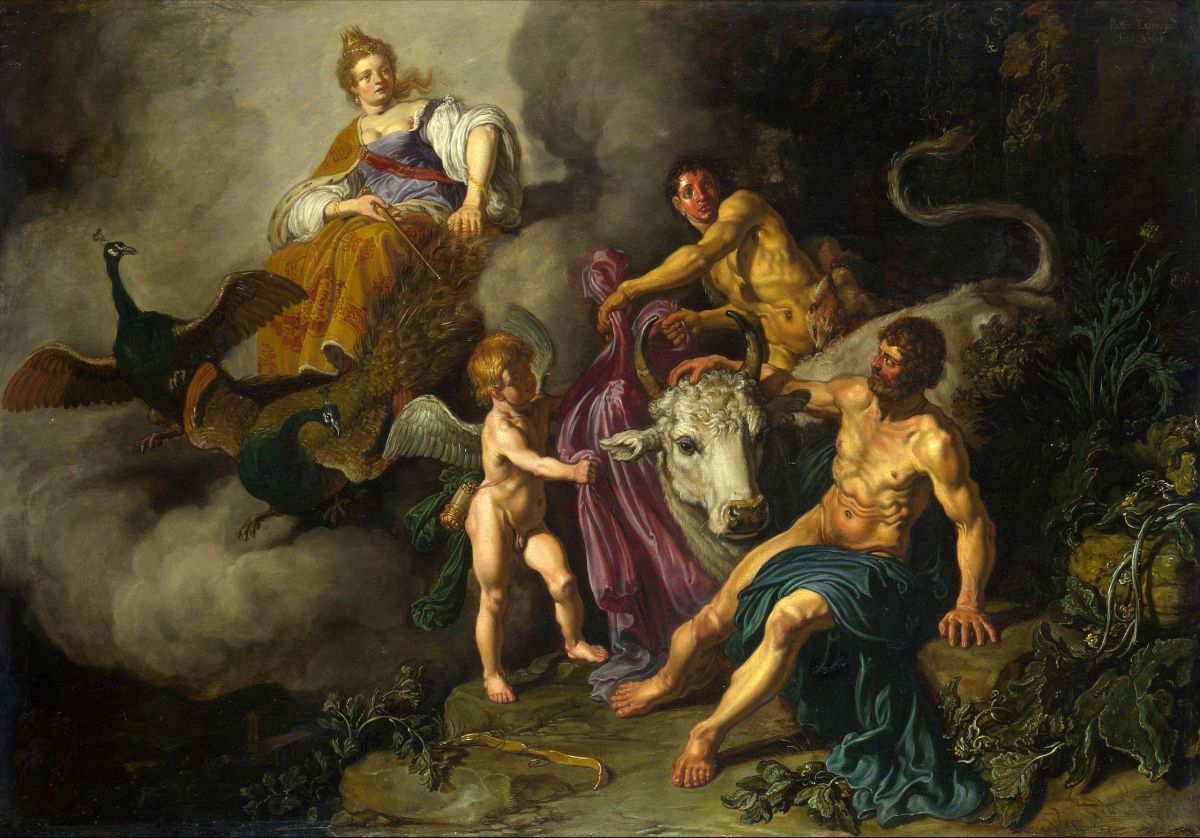
The group is next joined by Io, weary and haunted, in the form of a white heifer. Io was a princess and priestess of Argos who caught the eye of Zeus. Though she tells Prometheus she initially refused his advances, Zeus overcame her objections and took her as a lover. When Hera became suspicious, Zeus turned Io into the white heifer to shield her from the goddess’s jealousy, but Hera sent a gadfly to sting Io and drive her relentlessly across the earth.
12. Prometheus Foretells Io’s Future
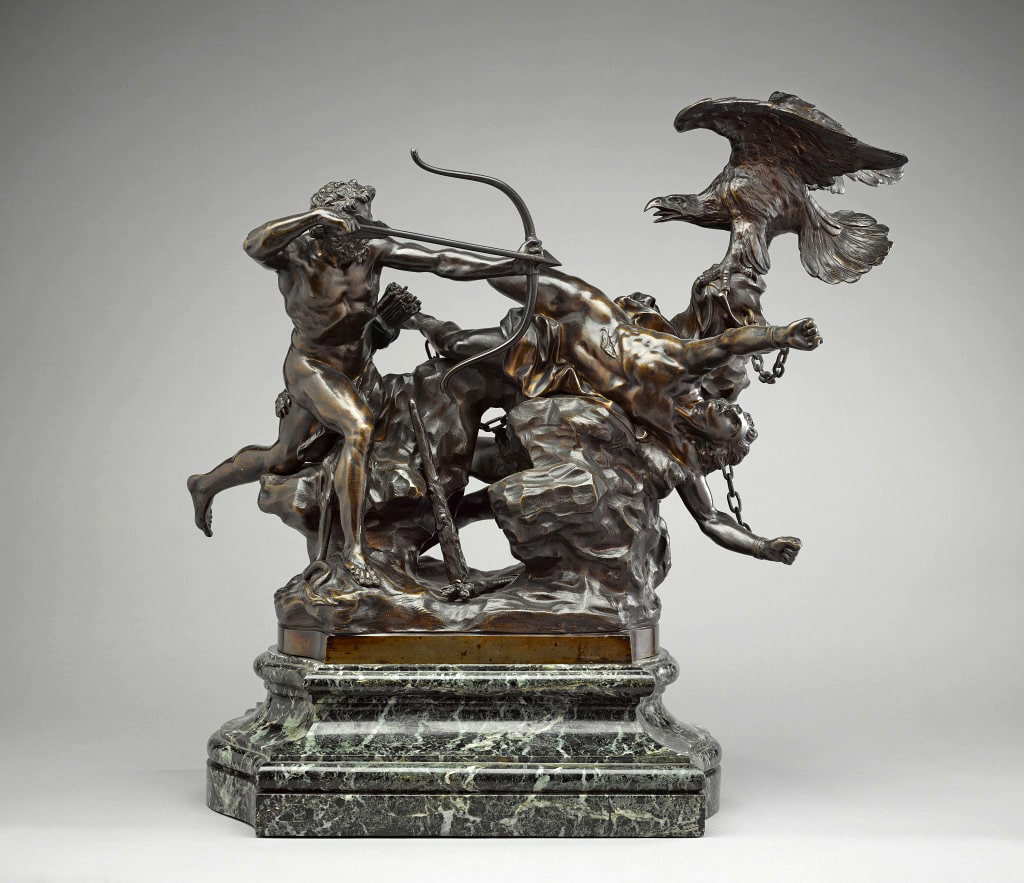
At Io’s pleading, the bound Prometheus reveals her future: that she is doomed to wander and suffer a long, but will eventually be restored to human form, and one of her descendants would not only be the strongest hero ever born but would also one day free Prometheus from his own captivity and suffering. As we learn from other ancient sources, this hero would be Heracles. Io exits, and Prometheus becomes defiant, declaring that not even Zeus himself can reign forever and that he will one day make a marriage that will threaten his future.
13. Hermes Is Sent to Prometheus
Prometheus Attacked by the Eagle, by Charles Renaud, 1756-1817, via the National Gallery of Art, Washington D.C.
Despite the warnings of Oceanus’s daughters, Prometheus continues in his assertions, and his words come to the ears of the omniscient Zeus, who sends Hermes down to extract the name of the one who would threaten Zeus.
14. Zeus’ New Threat
The Torture of Prometheus, by Salvator Rosa, 1646-1648, via the Galleria Corsini, Rome
Hermes and Prometheus exchange heated words, and Hermes reveals Zeus’s further threat:
“if thou wilt not obey my words, …first, this rocky chasm shall the Father split with earthquake thunder and his burning bolt, and he shall hide thy form, and thou shalt hang bolt upright, dandled in the rock’s rude arms. Nor till thou hast completed thy long term shalt thou come back into the light; and then the hound of Zeus, the tawny eagle, shall violently fall upon thy flesh and rend it as ’twere rags; and every day and all day long shall thine unbidden guest sit at thy table, feasting on thy liver till he hath gnawn it black. Look for no term to such an agony till there stand forth among the Gods one who shall take upon him thy sufferings and consent to enter hell far from the light of Sun, yea, the deep pit and mirk of Tartarus, for thee.”
15. The Tragic End
Prometheus Bound to Mount Caucasus, by Nicolas-Sébastien Adam, 1762, via the Louvre, Paris
Prometheus remains defiant and refuses to answer. Hermes advises the daughters of Oceanus to depart or else to be struck by the earthquake as well, but the girls refuse to leave, declaring they would rather bear Prometheus’s misfortunes than be proven false friends. Hermes leaves, the thunder and earthquake come, and Prometheus and the daughters of Oceanus are swallowed up in the abyss, and the curtain falls on Prometheus Bound.
16. and 17. After Prometheus Bound: The Liberation of Prometheus

Liberation of Prometheus, by Carl Bloch, 1864, Ribe Kunstmuseum, Denmark
Though Prometheus Bound ends as a tragedy, Prometheus’s story eventually has a happier ending. For just as Prometheus predicted, he was one day freed by a descendant of Io, none other than the great Greek hero and son of Zeus, Heracles. While traveling to complete his twelve labors, Heracles came upon Prometheus, who was still chained to the mountain and tormented daily by the eagle.
Liberated Prometheus, by Max Klinger, 1894, via the National Gallery of Art, Washington D.C.
Heracles killed the eagle and broke Prometheus free of his chains. Proud of his son’s strength, Zeus finally relented and allowed Prometheus’s freedom at last.
Source: thecollector.com



